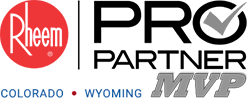
Licensing, bonding and insuring all serve to protect you through the process of installing HVAC equipment. If you’re not familiar with the terms, here’s an explanation of each one:
- Licensed contractors have met state and local requirements, including tests and training requirements, to be authorized to work in their field. In Denver, this includes holding a Supervisor Certificate. Licensing ensures that your contractors are knowledgeable and skilled in their field, and that they adhere to standards of professionalism.
- A bond is a form of insurance or surety purchased by the contractor. Among other things, this bond exists to cover any expenses arising from the job being performed improperly – a failure to pay for the appropriate permits, supply bills, subcontractors, etc. Without bonding, the homeowner may be held liable for these expenses, not the contractor. A bond can also pay for replacing work that was done improperly.
- Insurance covers tangible damages which may occur on the job. If your contractor causes property damage or suffers an injury on your property, insurance protects you from liability and covers the applicable costs.
Employing a licensed, bonded and insured contractor is the safe way to upgrade or install HVAC equipment. For more information on finding licensed, bonded and insured contractors in the Denver metro area, contact the Rheem Pro Partner.
Image via Shutterstock.com


